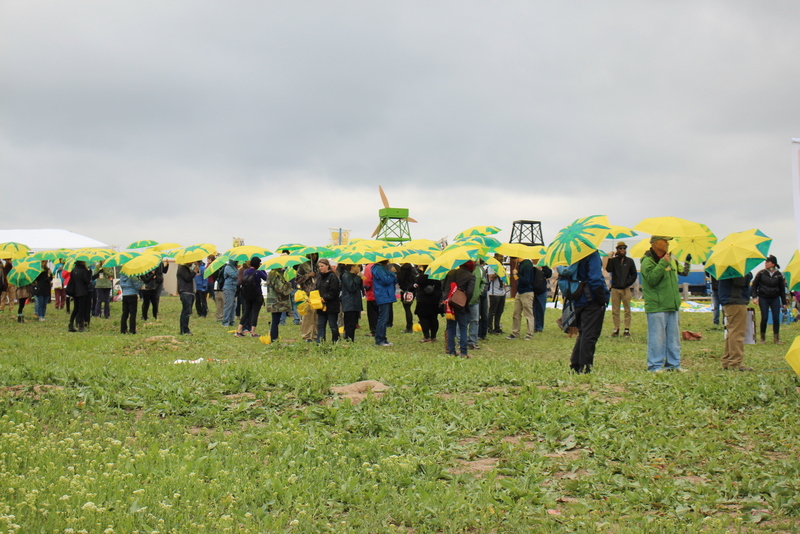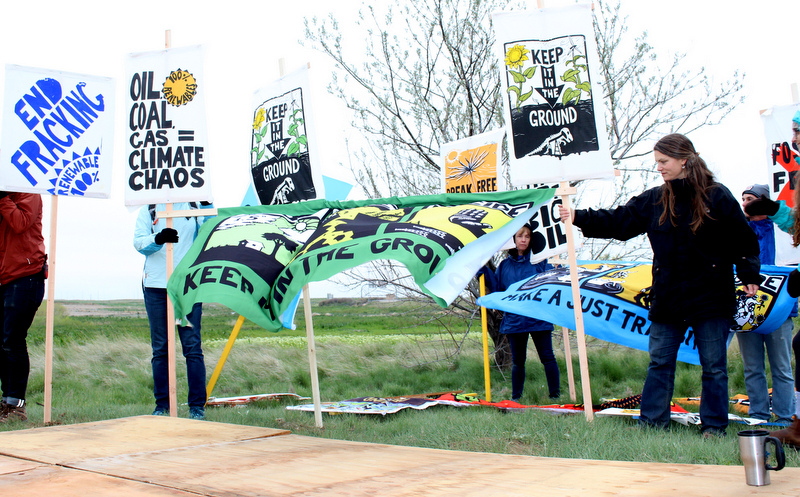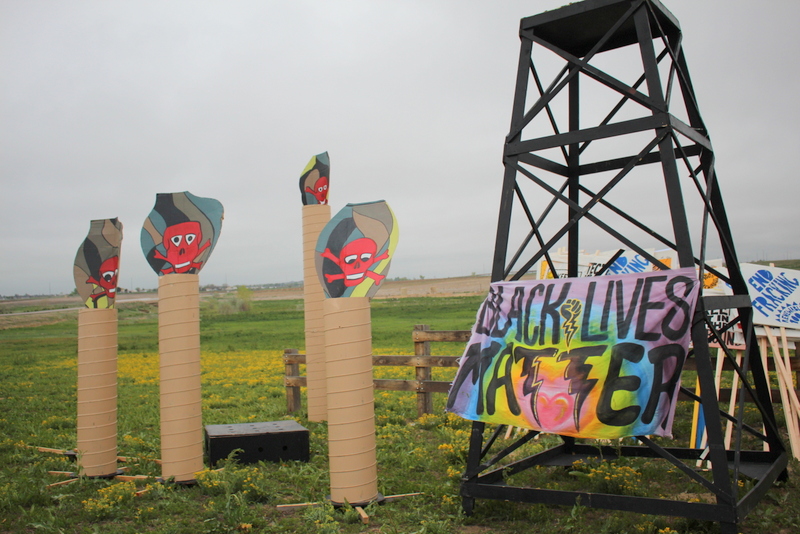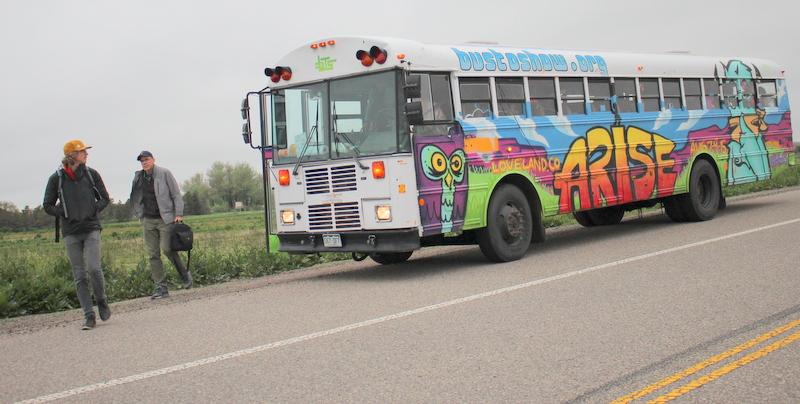A broad-issue coalition of thirty-one groups convened Saturday at Big Dry Creek Open Space in Thornton with the goal of stopping a proposed 10-acre hydraulic fracturing site, expected to be the largest in the nation to date. The gathering followed an earlier in the week action in Lakewood where hundreds were successful at delaying the sale of federal public land leases to the fossil fuel industry even though the sale eventually took place.
Under occasional rain and chilling temperatures, activists and their supporters from as far away as the east coast gathered at Thornton open space to send a message to the industry and to political representatives.
“Right over there they currently have test wells that they’re planning to build a 10-acre site. It’ll be one of the largest fracking sites in the nation. There’s an elementary school right across the street and they’re building low-income housing in this community 350 feet away because in Colorado old structures have a 500-foot setback and new structures only a 350-foot setback.”
The well is proposed near Silver Creek Elementary School. A common practice throughout the nation is to place fossil fuel industrial sites next to low income or marginalized communities.
350.org co-founder Bill McCibben participated in the action where he looked over the site where an existing well is located, “Here we are in the middle of a residential community bounded in by houses, and roads, and schools on all sides, it’s nuts.” 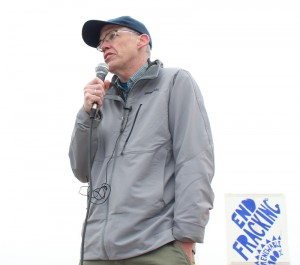
“Before I ran for office, you know you’re called in by all sorts of organizations so that they can meet you and I was called in by the Oil and Gas Association and by Colorado Association for Commerce and Industry,” 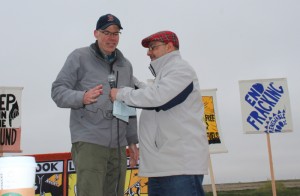 Representative Joe Salazar represents House District 31 where to site is located and said that the oil and gas industry has waged a campaign against him, “They wanted to get to know me as a candidate. So I sat in a room of about 100 of them and they started asking me questions about where I stood on oil and gas. And I told them, ‘Look, my family goes back way back here in the state of Colorado, long before there was a state of Colorado, long before there was a United States. So that being the case, I know what it means to be a caretaker of the earth. And I have a problem with your industry. So let’s have an understanding with one another. I won’t have a problem with your industry if you stop obliterating our environment and we won’t have to clean up your mess after you leave.’ I didn’t get their endorsement.”
Representative Joe Salazar represents House District 31 where to site is located and said that the oil and gas industry has waged a campaign against him, “They wanted to get to know me as a candidate. So I sat in a room of about 100 of them and they started asking me questions about where I stood on oil and gas. And I told them, ‘Look, my family goes back way back here in the state of Colorado, long before there was a state of Colorado, long before there was a United States. So that being the case, I know what it means to be a caretaker of the earth. And I have a problem with your industry. So let’s have an understanding with one another. I won’t have a problem with your industry if you stop obliterating our environment and we won’t have to clean up your mess after you leave.’ I didn’t get their endorsement.”
“I made a commitment to keep running bills against the oil and gas industry and this past year I ran the Oil and Gas Liability Bill. I’m committed to battling oil and gas next year. Next year they have promised to put in a million bucks against me in my little state house district race, but I don’t care. I’m happy to poke the bear and slap him in the face at the same time. An oil company doesn’t have to come to the city. They can go to the state; get the permits from the state.”
Thornton city council representative Val Vigil is fighting the oil and gas industry and said why.
“They can drill a mile and a half. They can drill two, two and a half, three miles horizontally and the city is not allowed to go in and check any of that at all whatsoever. None. What does that tell you? That because you’re a small guy, you have to jump hoops, but if you’ve got money and you’re a big company, you don’t? That’s not right.
That’s why I signed up as a volunteer to get petitions for 75 and 78.”
State initiative 75 if successful would give communities local control over issues such as fracking and would allow communities to restrict or even reject the presence of the industry without fear of state preemption-based lawsuits. Longmont voters approved a moratorium in 2012 and Fort Collins voters approved a moratorium on fracking that same year. Both cities were sued by the oil and gas industry and by the state’s own Governor John Hickenlooper. On May 2, 2016 the Colorado Supreme Court ruled against the city’s voters and in favor of the oil and gas industry prompting nationwide actions including in Thornton. In a press release issued prior to the Thornton action groups responded to the ruling,
“This decision is but the latest of many state government failures to protect Coloradans and the climate from the unacceptable harms and risks of fossil fuel production. Despite hundreds of studies demonstrating that drilling and fracking operations release dangerous levels of climate-disruptive methane, carcinogenic benzene, and other harmful substances into our air and water; our state courts, legislature, regulators and governor have persistently chosen to foster the oil and gas industry while ignoring the pleas of residents seeking to keep polluting industrial fracking facilities away from their neighborhoods and water supplies.
Initiative 78 would expand set back buffers from drill sites to 2500-foot statewide setbacks from homes, schools, parks, and water sources.
Val Vigil told The Nation Report that the test well and proposed well in question is owned by Synergy,
“So they’ll come in and they’ll drill one well and then some owners have wanted to annex to the city so that we can build houses and then build houses around them. But when you’ve got your house and they want to come back in your backyard and start drilling after you’ve bought, that is totally, totally wrong. You can’t do that. The health issue is the biggest issue in this. We don’t know what’s going on. Nobody knows. You have a well right here that I’m looking at now. They’ve had three leaks already in the last year.”
“They came in and they spilled up in there so they had to come in and dig up all the contaminated dirt and haul it out. Guess what happened? When they got on York Street just down up in here. The driver forgot to lock the tail gate and they spilled half of it on the road. For crying out loud, this is supposed to be big huge companies. How can you make mistakes like that?”
The last action of the day was a march to the existing fracking well to plant sunflower seeds on the site even though it would mean trespassing to do it. Those who were willing to risk arrest descended to the site.
“We’ll be walking down the path and instead of this 10-acre industrial fracking site, we’re going to be planting the vision of the world that we would like to see.”
About 20 people decided to accept the risk. Moments later about five more followed. And then five more.
One police car was waiting and more arrived.
None was arrested.
A smaller group locked arms in front of the fence that surrounded the drill site equipment.
None was arrested. Police watched.
Another group then entered the area behind the surrounding barricade around the well.
Again, none was arrested.
While a group of about 30 stood at the road chanting words of support, those who were willing to risk arrested asserted their frustrations,
“We came to create life instead of destroy it.”
“When your child’s life is threatened, you do not ask a politician if it’s legal to save your child’s life.”
“The whole world is our backyard.”
“This is the last resort. The state government has failed us. The legislature has failed us.”
“Our governor has failed us.”
“Coloradans are being told by the Supreme Court that our unalienable rights to happiness and to defend our property are only unalienable when they don’t pertain to the oil and gas industry. We have done everything we can. We have gone through all the proper channels. The only avenues we have left are to change our constitutional law to make community’s rights to defend themselves from fracking the highest law in the land, and to put our bodies on the line in peaceful civil disobedience.”
“Are you afraid to arrest us? Did the boss tell you, ‘Don’t arrest them because maybe the press will have to report it? And then if the press reports that people are laying their bodies down where this toxic cancer-causing industrial activity is moving into our community, then people will say that that’s not ok. Maybe we don’t have to take it!”
“We will never go away. We live here.”
In all about seven police cars entered the site. One protester spoke directly to police, “How does it make you feel when you know that there’s an elementary school right over here that’s about to be poisoned? I just want you to think about that.”
Another asked, “Do any of your children go to that school? Think about if your kid were in that school and you had a toxic waste dump being built across the highway.”
“A law enforcement officer told me that if I crossed that line and came up here that I’m trespassing and I will be arrested. But they won’t arrest me because they are afraid that it will bring more people, and more people who don’t want toxic, cancer-causing industrial activities shoved down their throats. I’m trespassing and I’m not afraid. Arrest me!”
“This will not end until fracking ends.”
Then being warned of possible felony charges for climbing the stairs to one of the tanks to hang a banner that read DEFEND OUR COMMUNITIES, three then four, then five, then seven people climbed including 13-year old Lexy of Firestone in Weld County, Weld County is known around the world for the extensive density of its tens of thousands of fracking wells.
Thirteen-year old Lexy spoke to The Nation Report, “There’s not many people willing to fight for the people and I feel there needs to be that one person who needs to stand up to everybody and just fight until the end until you get what you want. And I just decided to fight until the end and get what I want. I want freedom for the people. I want an actual democracy. I want people to quit fracking and stop killing everybody.”
Then all seven police cars drove off.
Still the groups counted the action as a win.


